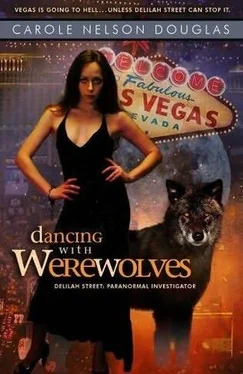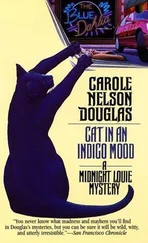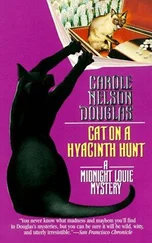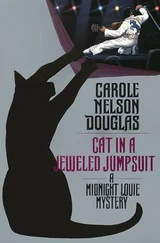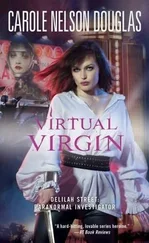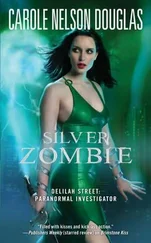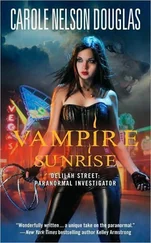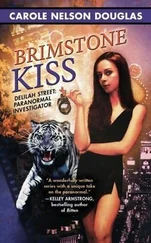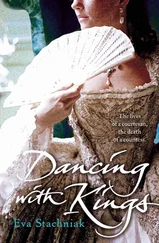Carole Douglas - Dancing with Werewolves
Здесь есть возможность читать онлайн «Carole Douglas - Dancing with Werewolves» весь текст электронной книги совершенно бесплатно (целиком полную версию без сокращений). В некоторых случаях можно слушать аудио, скачать через торрент в формате fb2 и присутствует краткое содержание. Жанр: Триллер, на английском языке. Описание произведения, (предисловие) а так же отзывы посетителей доступны на портале библиотеки ЛибКат.
- Название:Dancing with Werewolves
- Автор:
- Жанр:
- Год:неизвестен
- ISBN:нет данных
- Рейтинг книги:5 / 5. Голосов: 1
-
Избранное:Добавить в избранное
- Отзывы:
-
Ваша оценка:
- 100
- 1
- 2
- 3
- 4
- 5
Dancing with Werewolves: краткое содержание, описание и аннотация
Предлагаем к чтению аннотацию, описание, краткое содержание или предисловие (зависит от того, что написал сам автор книги «Dancing with Werewolves»). Если вы не нашли необходимую информацию о книге — напишите в комментариях, мы постараемся отыскать её.
Dancing with Werewolves — читать онлайн бесплатно полную книгу (весь текст) целиком
Ниже представлен текст книги, разбитый по страницам. Система сохранения места последней прочитанной страницы, позволяет с удобством читать онлайн бесплатно книгу «Dancing with Werewolves», без необходимости каждый раз заново искать на чём Вы остановились. Поставьте закладку, и сможете в любой момент перейти на страницу, на которой закончили чтение.
Интервал:
Закладка:
"I took you," he said finally, "for an amusing fool."
I'd been called worse. "I want this off!”
"Can't do it. It has a mind of its own, in case you hadn't noticed."
"It's your familiar."
"Now I'm a witch as well as a freak?"
"Or a warlock."
"You don't know what I am."
He had me there.
"But you'd love to find out." He leaned forward as I leaned away. "You can't resist finding out, can you, Delilah? Your whole life has been about finding out…about other people, not yourself. You don't have a life."
I understood that calling him a freak had brought this challenge and I was momentarily ashamed. A reporter gets used to feeling like an advocate of the downtrodden. Snow? Downtrodden? What about my manacled wrist?
Even as I thought that, Snow said, sympathetically, "It could be worse."
In demonstration, my solo handcuff linked to one that appeared on my left wrist.
Snow grinned and picked up the pen again with unbound hands. "Is your cuff half-empty, or half full?"
This kind of confinement ramped up my horizontal binding phobia, which Haskell had done nothing to help. I was stuffing panic down as fast as it raced up my esophagus to my throat, keeping cool.
One cuff immediately snapped open and my left wrist dropped free.
Snow spoke seriously. "The police didn't need to cuff you merely to bring you in for questioning."
I hated that he guessed, or knew, about my humiliating arrest. "This police detective named Haskell did," I said. "He's a bully and bigot."
"What's to be bigoted about you? Unless someone discriminates against annoying snoops."
"It was about the company I keep."
He digested that for a few seconds. "I still haven't made my point." He nodded at the half-handcuff. "It could be worse."
The cuff thinned and wrapped itself around my wrist like a serpent, spilling chains over the top of my hands and ringing one finger.
I'd seen some heavy metal bands. I knew this arrangement of chain-linked wrist bangle and ring was called a "slave bracelet."
"I'm a mammal person," I said, "I don't agree."
"Or even worse," Snow said.
I felt the icy swift shiver of the silver snake move up my arm and down my torso under my clothes, settling in a broad cold swath around my pelvis and streaking between my legs to harden into shape with a metal snick like a lock turning.
It felt like a chain-mail bikini bottom, not that I'd ever had a personal acquaintance with one. Haskell and his rough handcuffing were forgotten in the face of a medieval device turned bondage accessory: a freaking chastity belt. It recalled my recent nightmare. Fear became fury, then fear again.
"Obviously, it's not my familiar," Snow said, yawning.
Liar! He loved hiding behind his sunglasses and manipulating me into cheesy bondage gear that made me feel naked in front of him, physically and mentally. Stooping to calling him a freak hadn't helped.
"Still," he added, "it's a good thing that coveting is a commandment and not a Deadly Sin."
Before I could react or speak, the silver snake slid away again, ice water on the move, back to my wrist. Oh. It had morphed into a bracelet dripping charms: a circle of adorable Achilles faces, long-haired, hidden-eyed, sagacious.
"An admirable breed." Snow dropped the pen to the desktop like a small bomb. "I've always been partial to Lhasas myself."
I was still fighting not to blush at the unexpectedly warm sensations the adventurous example of "could be worse" had caused. Snow was interested in me, in teasing me? Sexually? Didn't he have enough groupies? I eyed the lovely Achilles bracelet and melted a little. Why did I suddenly feel in the wrong for descending to name-calling? That didn't stop a retort.
"I've got more to worry about than your migrating familiar or my hijacked drink recipe. My freedom is on the line."
He nodded. "Mine as well. Do your job, Delilah. That's the fastest route to the freedom you crave. And maybe mine."
I didn't know what he meant, didn't want to know. I did know it was a good exit line, so I took it.
Chapter Twenty-Nine
Nowadays a whole encyclopedia could occupy a disk the size of my little fingernail, and here I sat again in the Clark County Library looking at late twentieth-century microfilm of mid-twentieth century personalities and events.
But that's when Las Vegas was founded, in the post-World War II world of exploding prosperity and post-Prohibition mob expansion. I found it sad that banning liquor had spurred a drunken binge of organized crime in all areas of vice: gambling, prostitution, and racketeering. And the baby-booming Las Vegas founded by visionary psychopath Bugsy Siegel was at the heart of it all, where mobster and middle class met, each legitimizing the other.
Of course, like all visionaries, Bugsy had been punished for it: he had been found dead in 1947 of several bullets to the head at the age of forty-one. The thirties and forties and fifties were the era of drive-by shootings on an epic scale, like the St. Valentine's Day massacre. So they'd shot up Bugsy's pretty-boy face through his living room window.
I unreeled the early history of Las Vegas. First came the El Rancho Grande and the Last Frontier. The 1948 founding of Bugsy's beloved Flamingo Hotel was the turning point. The first hotel-casinos were small, upgraded motels three hundred miles from Los Angeles and an endless drive from the rest of the country, but they were an adventure destination for those lost souls in search of glamour. Only a few years later a successful animator named Walt Disney would create an adventure destination for the whole family called Disneyland.
Bugsyland had always been an adult playground, saturated with sex, booze, and gambling. And it had been worth fighting over.
I vaguely knew that the East Coast Italian Mob of Mobs, the Jewish mob (from whence Benjamin aka Bugsy Siegel), and other mobs, chiefly Chicago, which was Irish, met, maneuvered, kissed Judas cheeks and rubbed out each other in Las Vegas.
But I'd never heard of the French mobs until now. The Italian-Irish-Jewish mob triad made sense. All resulted from the massive influx of European immigrants through the Golden Door mentioned in the poem beneath the Statue of Liberty. The French had given the U.S. that Amazonian artwork and its defining image-not masses of refugees. Why would a French mob, small and superior, figure in the founding of Las Vegas?
So little was said of it that I had to literarily read between the lines of microfilm. The word "Inferno" in one article riveted my attention, though. "Monsieur Reynard, chevalier of France, has announced his plans to build a lavish hotel-casino called the Inferno, complete with Folies Bergere-style bare-breasted chorines, along the highway already occupied by El Rancho Vegas, the Last Frontier, and the late Bugsy Siegel's Flamingo hotel-casinos. French investment would indeed add luster to the thriving desert strip of nightclubs. Some have compared the future Inferno to Montmartre's Moulin Rouge in Paris."
I got it. The naughty French had invented the can-can and the topless chorus girl at the Moulin Rouge in the late nineteenth and early twentieth century. Why wouldn’t they exhibit an interest in such a wide-open site of American adult entertainment as early Las Vegas? Even today, Nevada was the only state in the Union to legalize houses of prostitution.
But a French mob? It defied imagination. Weren't the French far too refined to resort to machine guns and blood and guts…? Well, yes, except during their own late-eighteenth century bloodbath of a Revolution. American gangsters had come up with the Tommy gun, the Thompson sub-machine gun. The French had come up with a really big butcher's cleaver, the guillotine, a hundred-and-fifty-years earlier. French. Christophe. Could it be-? I finally found Reynard's first name. Christophe. And Reynard, if I remembered my convent-school French, meant "fox."
Читать дальшеИнтервал:
Закладка:
Похожие книги на «Dancing with Werewolves»
Представляем Вашему вниманию похожие книги на «Dancing with Werewolves» списком для выбора. Мы отобрали схожую по названию и смыслу литературу в надежде предоставить читателям больше вариантов отыскать новые, интересные, ещё непрочитанные произведения.
Обсуждение, отзывы о книге «Dancing with Werewolves» и просто собственные мнения читателей. Оставьте ваши комментарии, напишите, что Вы думаете о произведении, его смысле или главных героях. Укажите что конкретно понравилось, а что нет, и почему Вы так считаете.
